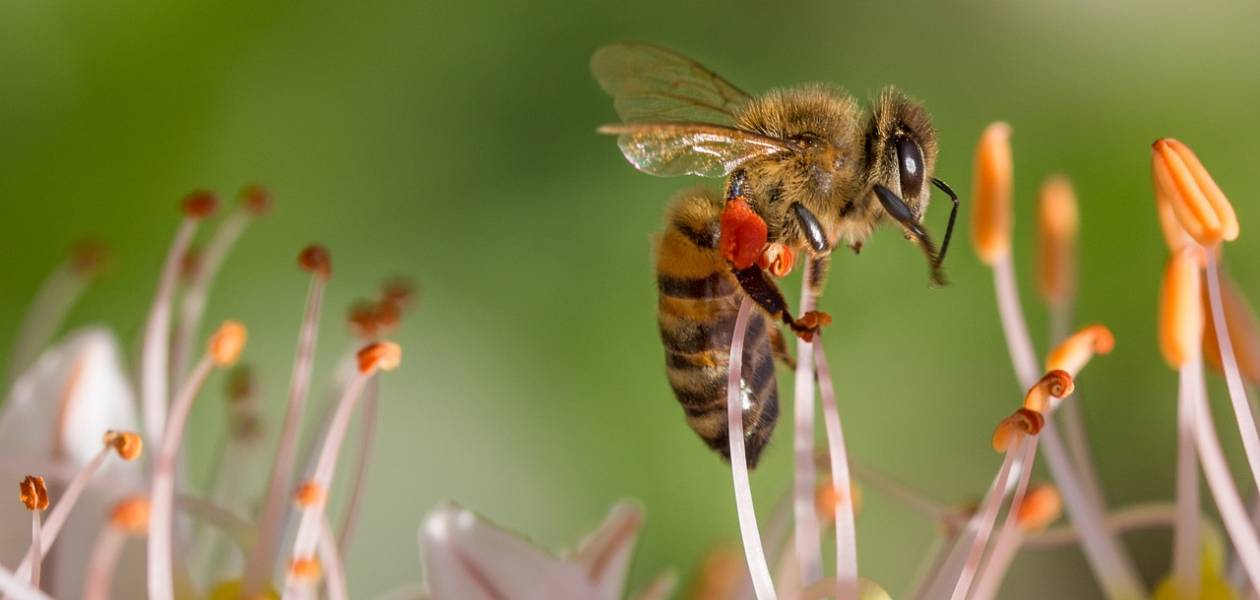
The Greek government has adopted a legally binding commitment to establish national monitoring to reverse the decline of pollinators. The EU Pollinator monitoring scheme (EU PoMS), an initiative to harmonise the monitoring of pollinator species across the EU, is a key support for Greek efforts. Other EU Member States have also made commitments to the scheme.
In March 2023, the Greek government became the first Member State to adopt a legally binding commitment to monitor pollinators. The new law commits the government to establish a National Action Plan to “reverse the decline of pollinators by 2030, and to gradually increase pollinator populations until satisfactory levels are achieved”. The Action Plan must include “appropriate indicators for monitoring pollinator populations. […] From 2030 onwards, the pollinator populations shall be measured every three years”. This article is part of a new law1 focusing on nature protection and restoration.
An ambition in line with the proposed EU Nature Restoration Law
Greece’s ambition reflects almost exactly the wording of the proposal for an EU Nature Restoration Law, announced by the European Commission in June 2022, which requires Member States to “reverse the decline of pollinator populations by 2030 and achieve thereafter an increasing trend of pollinator populations, measured every three years after 2030, until satisfactory levels are achieved”.
A bold move from Greece, but achieving the target will rely on setting up pollinator monitoring
The provisions of this new law are a bold move from Greece and a strong message towards increasing the level of ambition for reversing the decline of pollinators and supporting ambitious targets for the Nature Restoration Law. However, setting up national pollinator monitoring in Greece will be a challenge.
There is currently no robust biodiversity monitoring framework in Greece since surveys are carried out without any permanent funding and monitoring focuses mainly on the species listed in the EU Habitats Directive. This does not provide any information about pollinator decline because the Directive only protects a small number of butterfly and moth species, but no bee, hoverfly, or other pollinating species.
There is no dedicated funding allocated for the implementation of the new law, so financing the roll out of national monitoring will require new sources of funding. For reference, the 2021 proposal for options for an EU pollinator scheme (EU PoMS) estimated individual costs for the establishment of pollinator monitoring sites for each country. In Greece, annual costs for the establishment of 65 monitoring sites have been estimated at € 290,036 and the total costs over 10 years at € 2,909,264. This estimate will need revising in light of the final details of the Nature Restoration Law (estimates were given prior to the proposal).
Furthermore, the government faces wider challenges in implementing biodiversity policy. A recent assessment of the latest action plan supporting the implementation of the Greek biodiversity strategy (2014-2022) showed that none of the targets of the strategy made significant progress. In July 2019, Greece was referred to the Court of Justice of the EU over its failure to adequately protect natural habitats and species included in the Natura 2000 network.
The EU Pollinator Monitoring Scheme is supporting monitoring efforts across the EU
The EU Pollinator Monitoring Scheme (EU PoMS) is an initiative aiming to harmonise the systematic monitoring of trends and status of pollinator species across the EU. Setting up this monitoring mechanism was a key action of the 2018 EU Pollinators Initiative under its commitment to improve knowledge of pollinator decline, its causes, and its consequences. The EU PoMs design consists of a core or ‘Minimum Viable Scheme’ which covers the essential pollinator taxa (bees, hoverflies and butterflies), and complementary approaches including moths and rare and threatened species.
The EU PoMS initiative started a series of test pilots in 2022, aiming to be operational in nearly all Member States in 2023. The SPRING project was a Preparatory Action launched by the Commission to support implementation, testing, and refining of the EU PoMS pilots.
The University of the Aegean in Greece, a partner in the SPRING project, has been testing the EU PoMS methodology in a small number of sites in a small geographic area. Greece has very few taxonomical experts . The pilot has required substantial financial and technical support, highlighting the magnitude of the challenge to setting up a full monitoring scheme across the country.
Member States are starting from very different positions in terms of pollinator monitoring, regarding taxonomic capacity; availability of citizen scientists; existing pollinator monitoring infrastructure; knowledge of national pollinators; and bioclimatic conditions. This means that rolling out an EU scheme will require substantial capacity building and preparation, both in terms of taxonomic and human resources, as well as infrastructure.
Steps have been taken in other Member States. The Irish government committed to funding a pilot National Pollinator Monitoring Scheme in July 2021. The scheme is monitoring wild pollinators (bumblebees, solitary bees, hoverflies, and butterflies) across a network of 50 sites incorporating farmland, semi-natural and public land. France piloted monitoring on 25 test sites in 2022, coordinated nationally by the Office Français de la Biodiveristé (OFB). In Luxembourg, the nature parks network is setting up a trapping network. The Croatian government and others are committed to the establishment and implementation of robust pollinator monitoring as a priority.
The EU PoMs aims to establish pollinator monitoring systems in all Member States by 2026, and then bring together the data to feed an EU pollinator indicator by 2030.
Pollinator monitoring is crucial for a better understanding of the mechanisms behind pollinator decline and to measure our success at safeguarding pollinators and the values they generate. It is also critical to ensure that public and private initiatives take informed and targeted decisions for pollinator conservation.
References
1 This law comprises 275 articles covering various topics. The article on pollinator (art. 176) is part of chapter A of section D (articles 173-179), focusing on Nature Protection and Restoration.
Written by : Laure-Lou Tremblay
Sources : IEEP
Posted on 2023-05-19 16:05








Comments